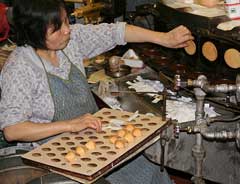What's Inside Fortune Cookies
The fortune cookie is a familiar sight in Chinese restaurants, in America anyway. The bent shells of cooked dough containing slips of paper with various forms of information have been around since the early 20th Century (although no one can say for sure who invented them).  A typical recipe for making a fortune cookie calls for ingredients butter, flour, oil, sugar, and vanilla. (The original Japanese version used miso instead of butter and sesame instead of vanilla.) Some recipies also include eggs. Bakers mix the ingredients and pour the resulting batter onto a grill or into circular shapes on a baking sheet and placed in an oven. The bakers then insert the slips of paper while the dough is still hot. Fortune cookies were made by hand for many years. The invention of a cookie-making machine in the 1980s introduced mass production to the baking process. In the 21st Century, estimates are that 3 billion fortune cookies are made each year worldwide. Most of those are consumed in the U.S. Wonton Food in Brooklyn, N.Y., makes 4.5 million fortune cookies each day. Some manufacturers produce their own fortune slips; other manufacturers outsource this element of production. Yang's Fortunes, based in San Francisco, produces 4 million paper fortunes a day. The sources for the "fortunes" themselves have changed through the years. Some of the first fortunes were sayings from the Christian Bible or from the Chinese philosopher Confucius. Other early sayings came from Aesop's Fables or from Benjamin Franklin's Poor Richard's Almanack. Fortune cookies today contain some of those same things, along with more modern pithy sayings, jokes, and lottery numbers. Examples of fortunes include the following: Advice 
Sayings
Predictions
|
|
Social Studies for Kids
copyright 2002–2026
David White




